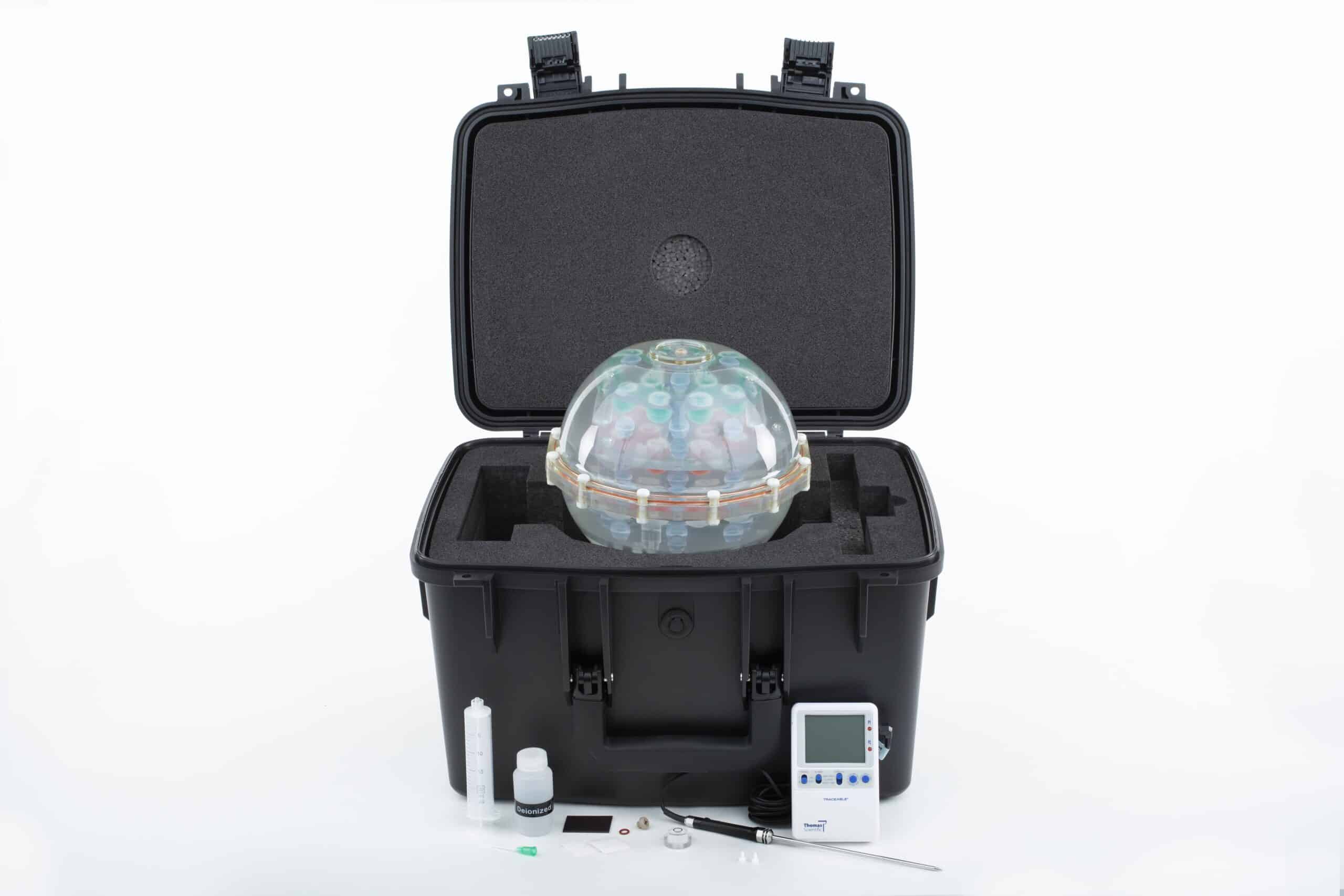A T1 and T2 Imaging Phantom with Tremendous Character
The “Classic NIST” Premium System Phantom turns MRI standardization on its head with all the characterizing necessities for qMRI advancers.
This all-in-one System Phantom houses NIST-traceable contrast tissue mimics and precision tools for next-generation MRI standardization.
NIST Certificate Number 80100S-20200610-C1. Calibrations were for solutions and phantoms provided to the NIST/NIBIB lending library
Proudly developed in collaboration with
Know the specs
- 231 mm diameter
- Plates support 56 fiducial spheres filled with CuSO4, a 14 element T1 NiCl2 array, a 14 element T2 MnCl2 array, and a 14 element proton density array
- Three resolution patterns: one 1 mm to 0.6 mm ±0.015 mm pattern, and two 0.8 mm to 0.4 mm ±0.015 mm patterns
- One wedge insert at 10° for slice profiling
- True dimensional/positional accuracy of ±0.1 mm on all key elements
- Physical and MR key to precisely determine phantom alignment
Evaluated MRI characteristics
- B1 and B0 non-uniformity
- Geometric linearity
- Gradient amplitude
- Slice profile and slice positioning accuracy
- Landmark accuracy
- System center frequency drift (short time duration)
- Resolution and SNR
- Accuracy and precision of T1, T2, and proton density measurements
NiCl2-containing spheres for T1 mapping between 20 ms and 1900 ms, 3.0 T at 20°C
The CaliberMRI Premium System Phantom’s T1 spheres contain nickel chloride of varying concentrations so you can standardize T1 longitudinal relaxation so qMRI brain researchers can analyze different properties of soft tissues using characteristic T1 water signals.
MnCl2-containing spheres for T2 mapping between 5 ms and 550 ms, 3.0 T at 20°C
The CaliberMRI Premium System Phantom’s T2 spheres contain manganese chloride of varying concentrations so users can standardize T2 transverse relaxation to ultimately analyze different properties of soft tissues.
Proton density spheres for PD mapping between 5% and 100%
The CaliberMRI Premium System Phantom’s proton density 5%-100% array standardizes proton density in relation to typical tissue water content, in addition to precisely estimating the signal-to-noise ratio (SNR).
Introducing the Exclusive New Liquid Crystal MR-Readable Thermometer
Expand the temperature range capabilities of MRI standardization with the one-of-a-kind MR-readable thermometer
MRI standardization just got even easier with the integration of the CMRI patented LC MR-Readable Thermometer, developed in collaboration with NIST.1 Now qMRI advancers can standardize between 15°C and 24°C while simultaneously scanning the Essential System Phantom.
Compare & Contrast Premium vs. Essential Temperature Features
Contains CMRI's patented LC MR-Readable Thermometer for temperature standardization between 15°C and 24°C while scanning.
1 | This product is covered by United States patent number 10,809,331.
Achieve MR image uniformity utilizing CMRI’s precisely-placed fiducial reference markers
Identify geometric distortion, image uniformity, and B1 homogeneity. CMRI’s 56 fiducial reference markers are placed with a precision of 150 μm (microns) so users can obtain the premium insight into scanner distortions.
Compare & Contrast & Premium vs. Essential Distortion Features
56 fiducial markers containing copper sulfate surrounded by a polycarbonate plastic sphere.
Enhance slice resolution and evaluate alignment
The CMRI slice profile inclination and declination wedges are angled precisely at 10° for advanced slice profile accuracy.
Compare & Contrast Premium vs. Essential Slice Resolution Features
Inclination and declination wedges angled precisely at 10°.
Expand your understanding of scan quality with the ultimate precision of the CMRI resolution insert
The CaliberMRI resolution insert minimizes misalignment on and off scan axis when processed with the recommended resolution MRI protocol.
Compare & Contrast Premium vs. Essential Resolution Features
Two sets of 4×4 resolution insert patterns offset by 10°. Includes an array of holes with one set of diameters ranging from 0.4 mm to 0.8 mm, and another set of diameters ranging from 0.6 mm and 1 mm.
Map beyond The Known with
the CMRI Premium System Phantom

